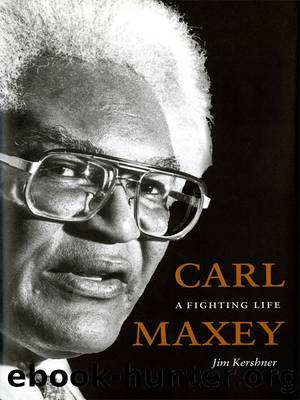Carl Maxey by Kershner Jim;

Author:Kershner, Jim;
Language: eng
Format: epub
Publisher: University of Washington Press
11
A RIGHT HOOK TO SCOOP JACKSON
Maxey's passionate hatred for the Vietnam War led him to revive his ambitions for elected office, which had lain dormant after being soundly trounced by Kathryn Mautz, now a Spokane County District Court judge. This time he chose a far bigger target. He waded fist-first into a political showdown with one of the most famous Vietnam hawks in the country: Senator Henry âScoopâ Jackson.
In January of 1970, Maxey announced that he was seeking Jackson's U.S. Senate seat and would run against him in the September Democratic primary. This was an audacious move: the Senate had only one black member at the time, Edward W. Brooke of Massachusetts, and before him there had been none since Reconstruction. Yet under any circumstances, this was a frankly quixotic fight, since Jackson was a firmly established political institution in both Washingtonsâthe state and the nation's capital. By 1970 Jackson had already been a U.S. senator for eighteen years. He was the chairman of the Interior Committee and a senior member of the powerful Senate Armed Services Committee. In 1960, John F. Kennedy had come within a hair of naming him his running mate. In 1968, another president had offered him the post of secretary of defense. That president was Richard Nixon, a Republican. Scoop turned it down, mainly because he was a lifelong, loyal, unwavering Democrat. But Maxey believed that Jackson was the wrong kind of Democrat, a prowar Democrat, leading his party in exactly the wrong direction. Maxey was, to put it bluntly, infuriated with what Jackson had become.
Maxey admitted that he had once been a âgreat supporterâ of Jackson, who was mostly liberal on social issues and had been an early champion of civil rights. Maxey had worked enthusiastically on Jackson's Senate campaigns through 1964. âI kind of like the guy,â Maxey had said earlier. In 1970, though, Maxey saw him merely as one of the main apologists forâand architects ofâNixon's bellicose Vietnam War strategy. âJackson, viewed in one dimension, votes liberal; viewed in another, he is the most conservative senator in the United States,â Maxey said in announcing his candidacy. âHis espousal of liberal programs is completely negated by his voting for military expenditures which sap the money and vitality of the country.â
Going after Jackson made no practical sense. Jackson had mountains of campaign money at his disposal and was overwhelmingly popular in the state among practically every voting bloc except the McCarthy antiwar faction. One potential Republican challenger famously quipped that running against Jackson âwould be like trying to climb Mount Rainer barefoot.â Yet Maxey, never one to back away from a cause, decided that someone had to make at least an effort toward taking back both the Democratic Party and the country. He did not entertain any illusions about his chances. âNo, he never thought he could pull it off,â said Lou Maxey. âNot even close. Never. He did it just to give people a voice.â He told the AP right after entering the race that âthe victory is in the running.
Download
This site does not store any files on its server. We only index and link to content provided by other sites. Please contact the content providers to delete copyright contents if any and email us, we'll remove relevant links or contents immediately.
Warrior Queens & Quiet Revolutionaries by Kate Mosse(238)
A Rome of One's Own by Emma Southon(237)
Executive Order No. 9066: The Terrible Injustice Of 1942 by Sollace Freeman(222)
The Explorers by Amanda Bellows(217)
A Wider Type of Freedom: How Struggles for Racial Justice Liberate Everyone by Daniel Martinez HoSang(196)
A Cultural History of Work in the Age of Empire by Victoria E. Thompson (ed.)(179)
Liberty's Dawn: A People's History of the Industrial Revolution by Emma Griffin(167)
The Grey Eagles of Chippewa Falls by John E. Kinville(162)
Respectability and Reform by Tara M. McCarthy(161)
The Crosswinds of Freedom by James MacGregor Burns(156)
Rethinking White Societies in Southern Africa by Duncan Money(155)
A Troublemaker May Surprise (The Troublemaker Series Book 2) by Genta Sebastian(147)
Evolution of Slavery Through the Ages: A Comprehensive World History of Slavery by PRESS VERITY(139)
Continental Strangers by Gemunden Gerd;(135)
A Teacher's Guide to Ladies of Liberty by Cokie Roberts Amy Jurskis(134)
Letters From London by Julian Barnes(132)
The Slave Ship, Memory and the Origin of Modernity by Martyn Hudson(131)
Beware the Masher by Kerry Segrave(121)
Hunger Dark Pen by Dark Pen(120)
